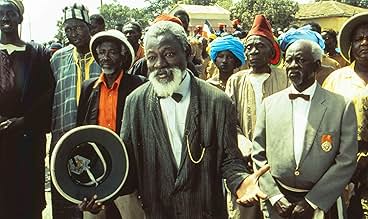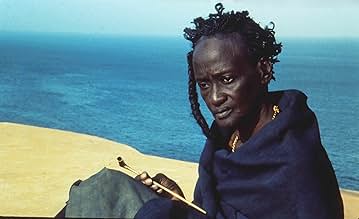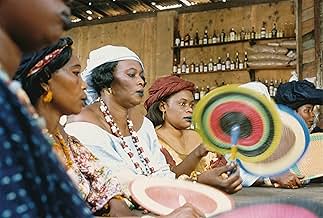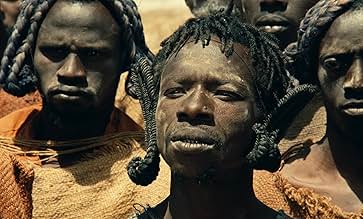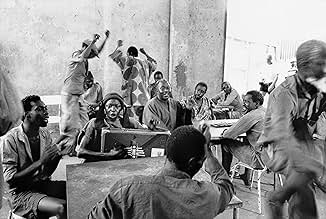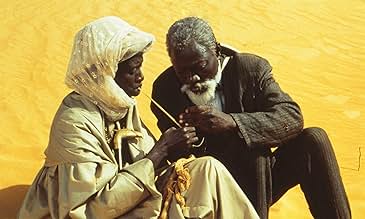CALIFICACIÓN DE IMDb
7.4/10
1.5 k
TU CALIFICACIÓN
Dramaan es el hombre más popular de Colobane, pero las cosas cambian cuando una mujer de su pasado vuelve a la ciudad.Dramaan es el hombre más popular de Colobane, pero las cosas cambian cuando una mujer de su pasado vuelve a la ciudad.Dramaan es el hombre más popular de Colobane, pero las cosas cambian cuando una mujer de su pasado vuelve a la ciudad.
- Dirección
- Guionistas
- Elenco
- Premios
- 1 premio ganado y 1 nominación en total
Omar Ba
- Le chef du protocole
- (as Omar Ba dit 'Baye Peul')
Issa Samb
- Le Professeur
- (as Issa Ramagelissa Samb)
Rama Thiaw
- La femme du Maire
- (as Rama Tiaw)
Abdoulaye Diop
- Le Médecin
- (as Abdoulaye Yama Diop)
Oumi Samb
- La danseuse
- (as Oumy Samb)
Tcheley Hanny
- Amazone
- (as Hanny Tchelley)
- Dirección
- Guionistas
- Todo el elenco y el equipo
- Producción, taquilla y más en IMDbPro
Opiniones destacadas
I've seen Kings Lord over before but it's Linguère turn. This Queen of Colobane has just about everyone abandoning their morals.
Hyenes is a foreign film from Senegal adapted from a play, The Visit, by Swiss playwright Friedrich Dirrenmatt. It is spoken in the local language with English subtitles.
This film is surreal. It makes political statements and explains how a poor, failing village becomes prosperous by the greed of it's residents and the revenge of one of it's former community members.
Linguere Ramatou, played by Ami Diakhate, was once a young women who left her home village under less than honorable terms and has now become wealthy. She returns to her village to bestow a large sum of money so that the poor village can become a prosperous city. However, she seeks revenge upon her once seducer Dramaan, played by Mansour Diouf.
Dramaan had abandoned Ramatou when they were young forcing her to go to the city to engage in "the oldest profession." Now, Dramaan is an elder grocer granting good on credit to the unemployed villagers whom come to his store much to the displeasure of his wife and co-store keeper.
The villagers, learning that Ramatou is returning after many years to bestow money upon the village, appoints Dramaan the local mayor and instructs him to once again "woo" Ramatou so that she will make a large contribution to the village of Colobane.
What happens next is a surreal tale of how Dramaan fawns over his once love and her reactions to this lover from long ago.
The simple actions of Dramaan are often funny as well as the actions of the village's local officials. Ramatou is willing to provide the large endowment to the village on one condition. You need to see the movie to know that condition and how a "soul" is traded for the donation.
The village customs are interesting for Westerners whom may have little or no knowledge of some African customs. It is a little difficult to follow the fast movie English subtitles while listening to the dialogue in Senegalese. The film may need to be viewed more than once for the Westerner to fully comprehend the story and motivations of the principal players.
This film is surreal. It makes political statements and explains how a poor, failing village becomes prosperous by the greed of it's residents and the revenge of one of it's former community members.
Linguere Ramatou, played by Ami Diakhate, was once a young women who left her home village under less than honorable terms and has now become wealthy. She returns to her village to bestow a large sum of money so that the poor village can become a prosperous city. However, she seeks revenge upon her once seducer Dramaan, played by Mansour Diouf.
Dramaan had abandoned Ramatou when they were young forcing her to go to the city to engage in "the oldest profession." Now, Dramaan is an elder grocer granting good on credit to the unemployed villagers whom come to his store much to the displeasure of his wife and co-store keeper.
The villagers, learning that Ramatou is returning after many years to bestow money upon the village, appoints Dramaan the local mayor and instructs him to once again "woo" Ramatou so that she will make a large contribution to the village of Colobane.
What happens next is a surreal tale of how Dramaan fawns over his once love and her reactions to this lover from long ago.
The simple actions of Dramaan are often funny as well as the actions of the village's local officials. Ramatou is willing to provide the large endowment to the village on one condition. You need to see the movie to know that condition and how a "soul" is traded for the donation.
The village customs are interesting for Westerners whom may have little or no knowledge of some African customs. It is a little difficult to follow the fast movie English subtitles while listening to the dialogue in Senegalese. The film may need to be viewed more than once for the Westerner to fully comprehend the story and motivations of the principal players.
Dürrenmatt's play The Visit is one of the best stories ever told about guilt and honesty. Would it be ruined by being transferred to a village in Africa by a visionary director whose main quality is to create images? That's what I asked myself before watching Hyenas.
And I was surprised in the most positive way. Diop Mambéty hardly changed the plot but supplied it with wonderful images which can only be found in Africa. So why didn't he change the story? Because he didn't have to. The story of the old lady taking revenge on her home village in the most cruel way fits perfectly into the context Mambéty placed it. It seems as though the story had never been imagined to take place in Switzerland; Senegal absorbs it completely.
The choice of Ami Diakhate is maybe the most perfect ever made by any film or stage director, as regards the role of Dürrenmatt's old lady. She has the mark of death and bitterness on her, the condescension of the rich and the hatred of those who have been humiliated. The other actors are charming, also well-cast, though sometimes I felt they would have needed a little more directoral guidance. However, my untrained European eye was not expected too much of: in some Asian, Afroamerican or African movies (shame on me) it is very hard for me to tell the various characters apart, which was not the case in Hyenas.
A wonderful story, a wonderful film. A pity that I will probably never see it again.
And I was surprised in the most positive way. Diop Mambéty hardly changed the plot but supplied it with wonderful images which can only be found in Africa. So why didn't he change the story? Because he didn't have to. The story of the old lady taking revenge on her home village in the most cruel way fits perfectly into the context Mambéty placed it. It seems as though the story had never been imagined to take place in Switzerland; Senegal absorbs it completely.
The choice of Ami Diakhate is maybe the most perfect ever made by any film or stage director, as regards the role of Dürrenmatt's old lady. She has the mark of death and bitterness on her, the condescension of the rich and the hatred of those who have been humiliated. The other actors are charming, also well-cast, though sometimes I felt they would have needed a little more directoral guidance. However, my untrained European eye was not expected too much of: in some Asian, Afroamerican or African movies (shame on me) it is very hard for me to tell the various characters apart, which was not the case in Hyenas.
A wonderful story, a wonderful film. A pity that I will probably never see it again.
A stunning adaptation of Friedrich Durrenmatt's coldly brilliant play, The Visit, HYENES (hyenas) actually improves on the story by transposing the action to a Senegalese village. A fabulously wealthy old woman, who was born in the village but run out in disgrace as pregnant youth, returns and promises the villagers a fortune on one condition: that they kill the man who ruined her, an aged man who is the town's popular, good-natured grocer.
By moving the story from Durrenmatt's European setting to a dirt-poor African village, all the tensions are heightened, and the director Mambety sets the huge issues in high relief against the desert backdrop: justice, betrayal, revenge, guilt, greed (or need?), loyalty, and charity are played out in a searing (and searingly beautiful) desert, filmed with the grace of Bergman and written with the wryness of Bunuel. There are no good guys. It's up to you if there are bad guys. Everyone is a predator.
By moving the story from Durrenmatt's European setting to a dirt-poor African village, all the tensions are heightened, and the director Mambety sets the huge issues in high relief against the desert backdrop: justice, betrayal, revenge, guilt, greed (or need?), loyalty, and charity are played out in a searing (and searingly beautiful) desert, filmed with the grace of Bergman and written with the wryness of Bunuel. There are no good guys. It's up to you if there are bad guys. Everyone is a predator.
Watched this 30 years after its creation and am very glad I did.
A short review : the way it seems I am should feel about Fellini, I feel about this film. I enjoy some Fellini films, but for whatever reason I felt more connected to this tale.
This film has plenty of spectacle. I mention fireworks, but a carnival in fact sprouts forth from the land (and the pursue of the dishonored woman returning to her home town).
There are both metaphoric and literal hyenas circling the town. The casting of Ami Diakhate was great and this the only film she ever made as far as I can tell. Feels like that might be a story in itself.
Just read an interview with the director (who died 7 years after this film from lung cancer, perhaps a colonial-induced cancer?) Anyways I think he was just a vibrant artist and able to guide dreams both as the director of the film and as a character within it. A master puppeteer never lets you see the strings.
That scene towards the end where Diakhate's character meets with her former lover/enemy/despoiler/mayor/public enemy is rather remarkable. From gazing out at the ocean together sharing an intimate smoke, to Diakhate descending into what looks like a tomb watching from afar as the mayor meets symbolic hyenas on the outskirts of town.
Such a smooth dream-like portrayal of a jarring event.
Next up for me "Touki Bouki"
A short review : the way it seems I am should feel about Fellini, I feel about this film. I enjoy some Fellini films, but for whatever reason I felt more connected to this tale.
This film has plenty of spectacle. I mention fireworks, but a carnival in fact sprouts forth from the land (and the pursue of the dishonored woman returning to her home town).
There are both metaphoric and literal hyenas circling the town. The casting of Ami Diakhate was great and this the only film she ever made as far as I can tell. Feels like that might be a story in itself.
Just read an interview with the director (who died 7 years after this film from lung cancer, perhaps a colonial-induced cancer?) Anyways I think he was just a vibrant artist and able to guide dreams both as the director of the film and as a character within it. A master puppeteer never lets you see the strings.
That scene towards the end where Diakhate's character meets with her former lover/enemy/despoiler/mayor/public enemy is rather remarkable. From gazing out at the ocean together sharing an intimate smoke, to Diakhate descending into what looks like a tomb watching from afar as the mayor meets symbolic hyenas on the outskirts of town.
Such a smooth dream-like portrayal of a jarring event.
Next up for me "Touki Bouki"
¿Sabías que…?
- TriviaRestored over the course of 2017 by Eclair Digital in Vanves, France. The restoration was taken on by Thelma Film AG.
- ConexionesFeatured in La historia del cine: Una odisea: Movies to Change the World (2011)
Selecciones populares
Inicia sesión para calificar y agrega a la lista de videos para obtener recomendaciones personalizadas
- How long is Hyenas?Con tecnología de Alexa
Detalles
Taquilla
- Total en EE. UU. y Canadá
- USD 24,672
- Total a nivel mundial
- USD 24,672
Contribuir a esta página
Sugiere una edición o agrega el contenido que falta


